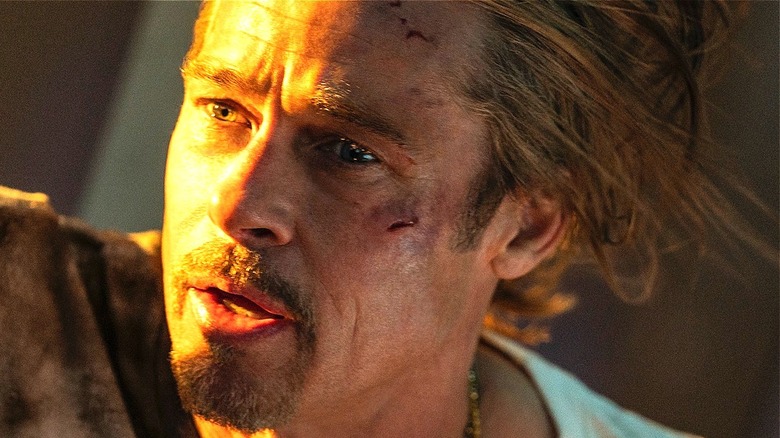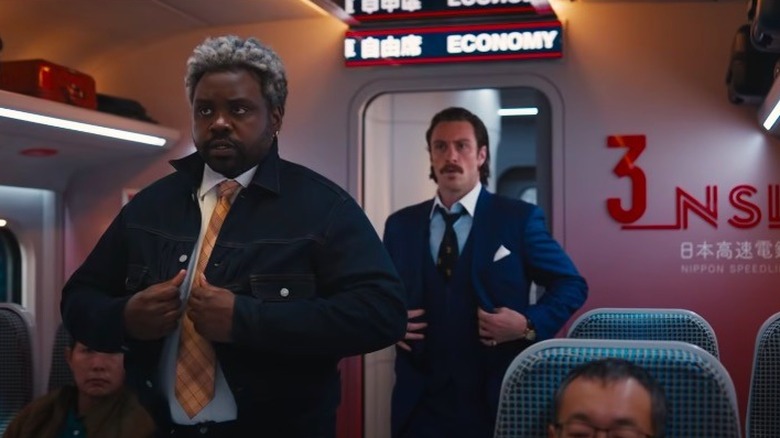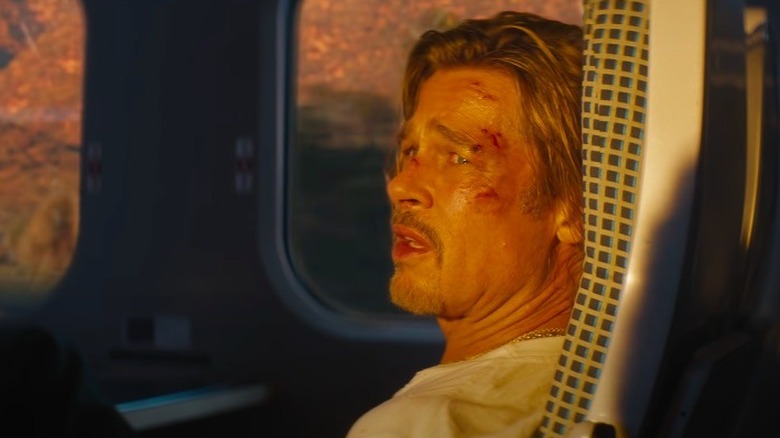Why Bullet Train's Casting Was So Controversial
The upcoming action comedy film from Sony Pictures, "Bullet Train," directed by David Leitch, is slated to premiere in theaters on August 4, 2022. Based on the novel "Maria Beetle" (published in English as "Bullet Train") by Japanese author Kōtarō Isaka and adapted by Zak Olkewicz, the film follows American assassin Ladybug (Brad Pitt), who is ready to give up the job when he is assigned a mission to retrieve a briefcase on a bullet train that is going from Tokyo to Kyoto. While on the train, Ladybug comes across a slew of other trained assassins and soon realizes that they have similar objectives.
"Bullet Train" boasts a large ensemble cast with plenty of recognizable names that extends far beyond Pitt in his leading role. The many other assassins are played by the likes of Joey King, Aaron Taylor-Johnson, Brian Tyree Henry, Andrew Koji, Hiroyuki Sanada, Zazie Beetz, and Benito A. Martínez Ocasio (aka rapper Bad Bunny). Further, Sandra Bullock plays Maria Beetle, Ladybug's contact and handler, Michael Shannon plays White Death, the leader of a large criminal assassin organization, and Logan Lerman plays White Death's son.
Despite the slew of notable names, "Bullet Train" has found itself in a bit of hot water over its casting decisions ahead of its release. Here's a breakdown of why the casting of "Bullet Train" is so controversial.
Bullet Train is accused of whitewashing
As mentioned above, the film is based on a novel by Japanese author Kōtarō Isaka and, of course, takes place in Japan on a train that is traveling from Tokyo to Kyoto. However, where the film differentiates from the novel is that, in the book, all of the characters are Japanese. The film boasts only two actors of Japanese descent in leading roles: Andrew Koji and Hiroyuki Sanada. Masi Oka and Karen Fukuhara are also in the cast but in minor roles. Because of this, "Bullet Train" is facing whitewashing accusations.
Earlier this year, in March, Rachel Tao wrote an extensive article for AsAm News chronicling the perceived whitewashing. Here, she interviewed Japanese American Citizens League executive director David Inoue, who said he believes the criticism is fair. "I absolutely think charges of whitewashing are accurate as this is a story based around what were originally Japanese characters and it remains set in Japan," Inoue said. "Foreigners, or gaijin, remain a distinct minority in Japan, and to populate the movie with so many in the leading roles is ignoring the setting."
Inoue also called out Brad Pitt directly, adding, "To see a film set in Japan with Japanese characters only as the background is offensive, and some of them should have been asking questions about this. Someone of Brad Pitt's stature has the ability to do that and he failed to say anything." Inoue then added that, because of Brad Pitt's popularity in Japan, he can see why casting him makes sense, but that he'll still see it as a problem until Asian actors are more frequently cast in roles that would typically go to white actors.
Others argue that the situation is more nuanced
AsAm News also spoke with Milton Liu, the interim executive director of the Asian American Media Alliance, who has a more generous opinion about the casting of "Bullet Train." Liu began by noting that he is unable to make a fully formed opinion until seeing the film before going on to explain that the argument of whitewashing is a bit more nuanced when it comes to "Bullet Train."
"Obviously, there's a slippery slope of what is whitewashing, what is not, what is racially offensive, what is story-telling or creative license, and so forth," Liu said. "The author has approved this, and the production company that licensed this deal is a Japanese company that's trying to get into using Japanese IP for the western world. Not to say that those two things make it okay, but at least that's the right course; it's not some Hollywood White producer going out to Japan and finding the IP and really making it a whitewashed adaptation."
Liu then explained that, because Brad Pitt and Joey King's character names are changed, "Bullet Train" may be an example of a story intentionally being changed for a Western audience, rather than it being a tone-deaf casting choice of placing a white actor in a role clearly meant for an Asian actor. Liu gave the more problematic examples of "Ghost in the Shell" and "Aloha," which respectively saw Scarlett Johansson and Emma Stone, two white actresses, playing Asian characters.
Despite whitewashing possibly not being as big of an issue as some have accused, Liu believes that doesn't mean the film is without its problems. "So that's the question more than whitewashing, is the fetishization of Asian culture being 'exotic' when they just side notes to the story," he explained. "That's the issue that could be troublesome for this film."
The novel's author has defended the casting choices
Last month, Kōtarō Isaka, the author of the novel on which "Bullet Train" is based, spoke to The New York Times about seeing his book be brought to life on the big screen — and whether or not it bothers him that so few of the stars are Japanese.
NYT writer Motoko Rich noted that Isaka has embraced the more Westernized take of the film. Further, Isaka sees his novel as something that is malleable for adaptation. Isaka said, "[The characters are] not real people, and maybe they're not even Japanese."
Isaka also shared that he knew that his novel would make great material for the big screen and didn't care if some changes needed to be made in order for that to happen. "I don't have any feeling of wanting people to understand Japanese literature or culture," he continued. "It's not like I understand that much about Japan, either."
Sanford Panitch, a president of Sony Pictures Entertainment Motion Picture Group also spoke to the NYT, elaborating on how Isaka's willingness to have details changed from his novel contributed to their process of bringing the story to life. "[Isaka's adaptability] gave us comfort in honoring its Japanese soul but at the same time giving the movie a chance to get big giant movie stars and have it work on a global scale," he told the outlet.
"Bullet Train" opens in theaters on August 5. 2022.



